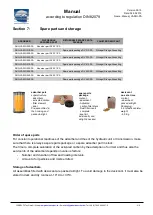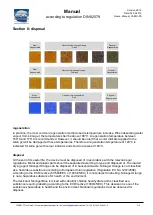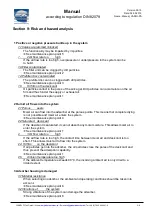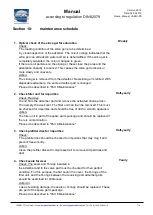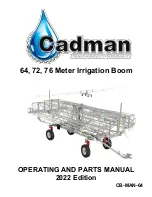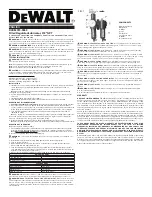
Manual
according to regulation DIN 82079
Version 09.19
Date: 02.09.2019
Name: Manual_VARIO-PA
GIEBEL FilTec GmbH • Web
• Tel +49 (0) 7946 944401-0
6/8
Section 9: Risk and hazard analysis
1 Positive or negative pressure builds up in the system
1.1Valves are jammed / blocked
The functionality may be impaired by impurities.
→
See maintenance plan point 5
1.
2Air flow rate too
high
If the air flow rate is too high, overpressure or underpressure in the system can be
to build.
1.3Filter contaminated
The filter unit can be clogged by dirt particles.
→
See maintenance plan point 2
1.4Prefilter disc contaminated
The prefilter disc can be clogged with dirt particles.
→
See maintenance plan point 3
1.5
Oil film on the desiccant
Oil particles collect in the pores of the silica gel. Dirt particles can accumulate on the oil
film and thus hinder the supply or exhaust air.
→
See maintenance plan point 1
2 Humid air flows into the system
2.1Porous
seals
Moist air can flow into the adsorber at the porous points. This means that complete drying
is not possible and moist air enters the system.
→
See maintenance plan point 4
2.2Saturated desiccant
If the desiccant is saturated, it cannot absorb any more moisture. This allows moist air to
enter the system.
→
See maintenance plan point 1
2.
3Air flow rate too
high
If the air flow rate is too high, the contact time between moist air and desiccant is too
short. This allows moist air to flow into the system.
2.4 Oil film
on the desiccant
If oil particles get into the adsorber, the oil particles close the pores of the desiccant and
thus prevent the adsorption capability.
→
See maintenance plan point 1
2.5
Ambient temperature too high
If the ambient temperature exceeds 80°C, the incoming ambient air is only dried to a
limited extent.
3 Adsorber housing is damaged
3.1Material resistance
When selecting an adsorber, the ambient and operating conditions should be taken into
account.
→
See maintenance plan point 6
3.2Vibrations of
the system
Strong vibrations of the system can damage the adsorber.
→
See maintenance plan point 6




